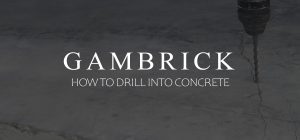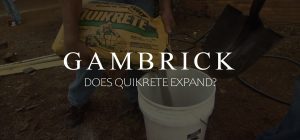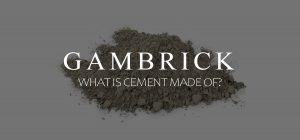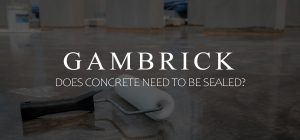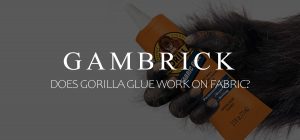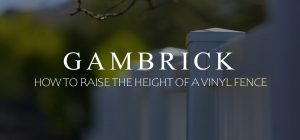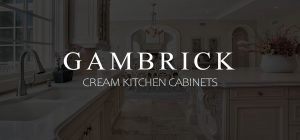
Can Concrete Screws Be Used In Wood?
Concrete screws can be used in wood. They have threads which can grab and hold onto wood just like they do concrete. But there are some big difference between wood screws and concrete screws. Concrete screws have a blunt tip instead of being pointed like a wood screw. This is because concrete screws need a pilot hole and can’t be driven in raw like a wood screw can. So if you want to use them in wood you need to predrill first. Second, they tend to be heavier and stronger with a wider diameter, which gives them more sheer strength. This makes them harder to break than the average wood screw.
A pilot hole has to be drilled before you can drive a concrete screw into solid concrete. But predrilling creates concrete dust inside the hole. To compensate for this, concrete screws have 2 rows of threads, one large and one small. The larger threads grip into the concrete, holding the screw in place, while the smaller threads remove dust from the hole. When you use a concrete screw in wood the smaller threads don’t serve a purpose.
Concrete screws are heavy duty and come with a variety of head designs. These include Phillips, Slotted, Square, Combination and Hex. Hex heads are the strongest and work great with a nut head and an impact driver. But they’re probably overkill for most wood projects unless you need a lag bolt.
I’ve been a mason for over 25 years and can tell you firsthand that if you’re using a concrete screw in place of a wood screw, and connecting wood to wood, you’ll probably be fine with a Phillips, Slotted or Square head.
Concrete screws are great for attaching a gate to concrete post or securing wood walls to a slab.
What’s The Difference Between Wood Screws And Masonry Screws?
Wood and masonry concrete screws are very similar in design, but they have a few big differences.
- Tip: Concrete masonry screws aren’t designed to be driven into concrete without a pilot hole. So their head is blunt and rounded. Wood screws do go in raw so the tip is very pointed.
- Diameter: Masonry screws are generally a thicker gauge with a wider diameter.
- Material: Concrete screws are made from a stronger material that’s more durable.
- Strength: Masonry screws are stronger and more durable than wood screws. They generally have more sheer strength and are harder to break off with lateral force. They can also handle more torque without snapping so you can use an impact driver to install them.
- Threads: Wood screws have a single row of threads while a masonry screw generally has 2.
- Length: The average wood screw is longer than the average masonry screw.
- Coating: Masonry screws are generally coated with a protective material and wood screws aren’t.
Masonry screws work in pretty much the same way as a wood screw. They’re installed into a material and grip tight with their threads. However wood screws can be driven in raw while concrete screws need a predrilled hole.
Predrilling a pilot hole for concrete screws can cause cracks if you don’t so it properly. These cracks can then be repaired with a concrete crack filler. To prevent cracks, predrill with a fresh masonry bit and a hammer drill.
Unlike wood screws, you do not have to remove nails and screws when you demo a concrete slab. When concrete is recycled, it’s smashed into tiny pieces and all metal is removed.
Do Tapcon Concrete Screws Need A Pilot Hole?
Tapcon concrete screws can not be drilled directly into concrete without a pilot hole. They require a pilot to be predrilled into the concrete before you install the screw. The pilot hole should be slightly smaller in diameter than the concrete screw and a little longer.
If the pilot hole is too wide, the screw threads won’t be able to grip the side walls of the hole. If this happens by accident you need to use a thicker screw.
The pilot hole needs to deep than the screw so that you can fully drive it into the hole. Also, predrilling creates a lot of dust which can settle at the bottom of the hole. Even though a masonry screw’s threads are designed to release the dust, some can still stay in the hole and gum up the screw. Making the hold deeper than necessary gives dust a debris a place to go that won’t interfere with the screw’s installation.
When you use a Tapcon screw to in wood, you still need a pilot hole. Even though there’s no dust to worry about, you still need the pilot because a concrete screws head is full and rounded. They’re not designed to be driven without a pilot so they don’t need a pointed tip like a wood screw has.
Can I Use Tapcon Concrete Screws In Pressure Treated Wood?
Yes. Tapcon concrete screws are what we use on all our custom homes to attach pressure treated wood plates to concrete. They’re very strong, durable and work indoors and out. We use them inside to attach wood frame bottom plates to the concrete basement slab or to secure wood to poured concrete walls or block. We also use them outside to attach wood to poured concrete, block or slabs. They’re a very versatile screw and easy to use.
In order to use Tapcon concrete screws with pressure treated wood, you need to predrill first. And you have to predrill through both the wood and concrete so you need two types of bits. A wood bit and a concrete bit.
- First I drill my pilot hole through the wood with a wood bit.
- Then I place the wood exactly where it needs to go and mark the hole.
- I then remove the wood and drill my pilot hole into the concrete using a concrete bit.
- Make sure the pilot holes are slightly smaller than the concrete screw.
- Place the wood back in position.
- Drive the concrete screw through the wood and into the concrete.
- Make sure you account for the thickness of the wood when you but the concrete screw. Standard wood is 1 1/2 thick so if you want 1 inch penetration into the concrete you need a 2 1/2 inch screw.
Tapcon concrete screws won’t rust and are resistant to the elements. So they’re safe for both indoor and outdoor use.
Do Concrete Screws Rust?
Most concrete screws like Tapcon have a protective coating which resists rust. But they’re not 100% rust proof. If the coating is damaged moisture can get in and eventually rust the screw. However many manufacturers like Tapcon and Simpson make stainless steel masonry screws which do not rust. They’re more expensive, but since stainless steel doesn’t rust, you don’t have to worry about the coating being damaged.
I usually use coated Tapcon masonry screws inside the home where water is less of an issue. But I use stainless steel masonry screws outside where they’ll frequently get wet. The only time I’ll use stainless steel masonry screws inside a home is in areas that may get flooded.
Summary: Can Concrete Screws Be Used In Wood?
Concrete screws like Tapcon can be used in wood. They have threads which can grab and hold onto wood just like they do concrete. But there are some big difference. Concrete screws have a blunt tip instead of being pointed like a wood screw. This is because concrete screws need a pilot hole and can’t be driven in raw like a wood screw can. So if you want to use them in wood you need to predrill first. Second, they tend to be heavier and stronger with a wider diameter. Because concrete screws are thicker they also have more sheer strength than the average screw which makes them very hard to break off.
A pilot hole has to be drilled before you can drive in a concrete screw. But predrilling creates concrete dust inside the hole. To compensate for this, concrete screws have 2 rows of threads, one large and one small. The larger threads are what grip into the concrete holding the screw in place. The smaller threads are designed to remove dust from the hole. When you use a concrete screw in wood the second smaller row of threads won’t do much.
Concrete screws are heavy duty and come with a variety of head designs. These include Phillips, Slotted, Square, Combination and Hex. Hex heads are the strongest and work great with a nut head and an impact driver. But they’re probably overkill for most wood projects unless you need a lag bolt. If you’re using the concrete screw in place of a wood screw and connecting wood to wood, you’ll probably be fine with a Phillips, Slotted or Square head.
If you have any questions about concrete screws, email or leave a comment below.

John Mazzuca | About | More Posts |
Custom Home Builder
John Mazzuca is a custom home designer and builder at Gambrick with over 25 years experience in the construction industry. John has designed, built and/or remodeled hundreds of homes, small buildings, and commercial projects. He writes about business, real estate, home building, and household electronics. His work has been featured in Fox Business, Better Homes & Garden, House Beautiful, and more.


